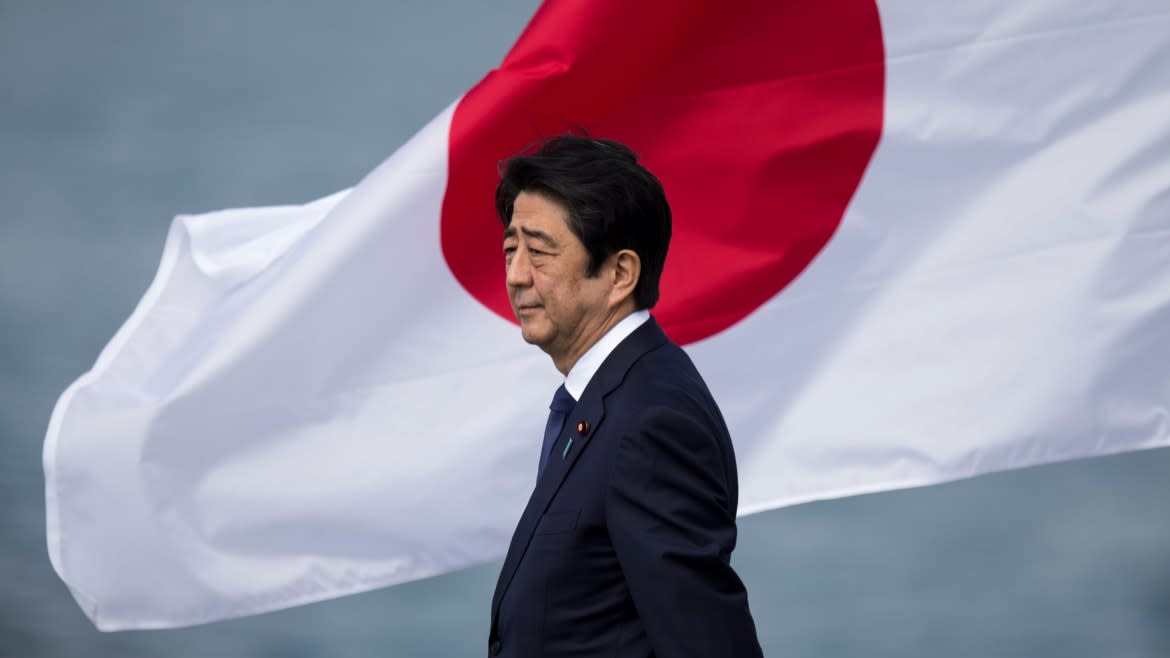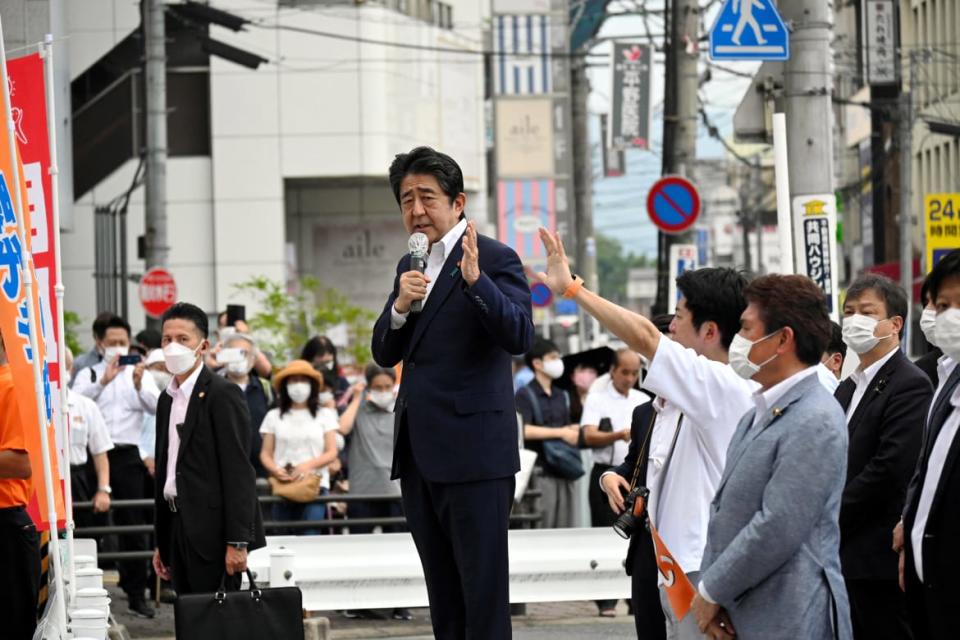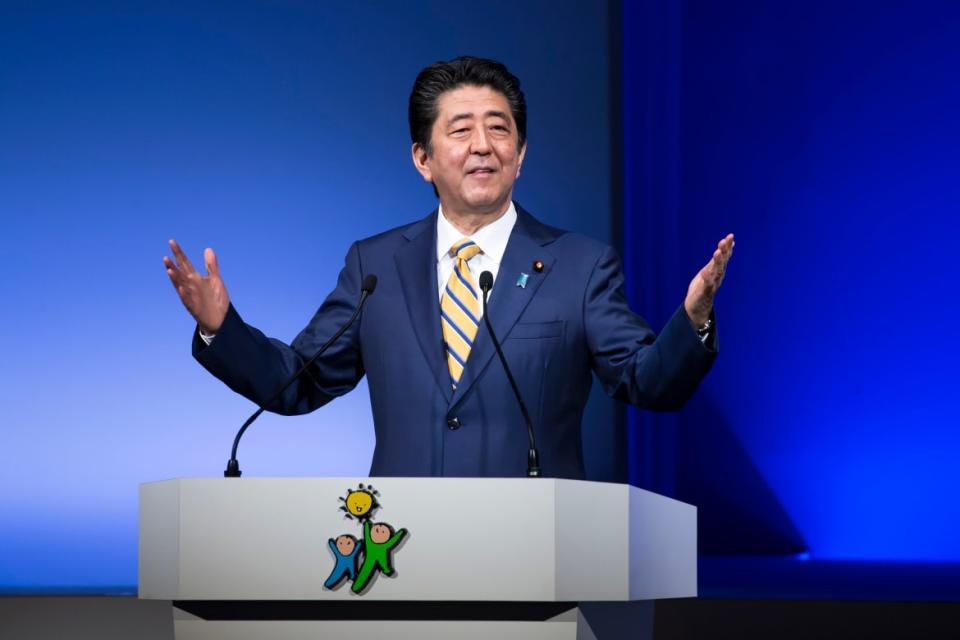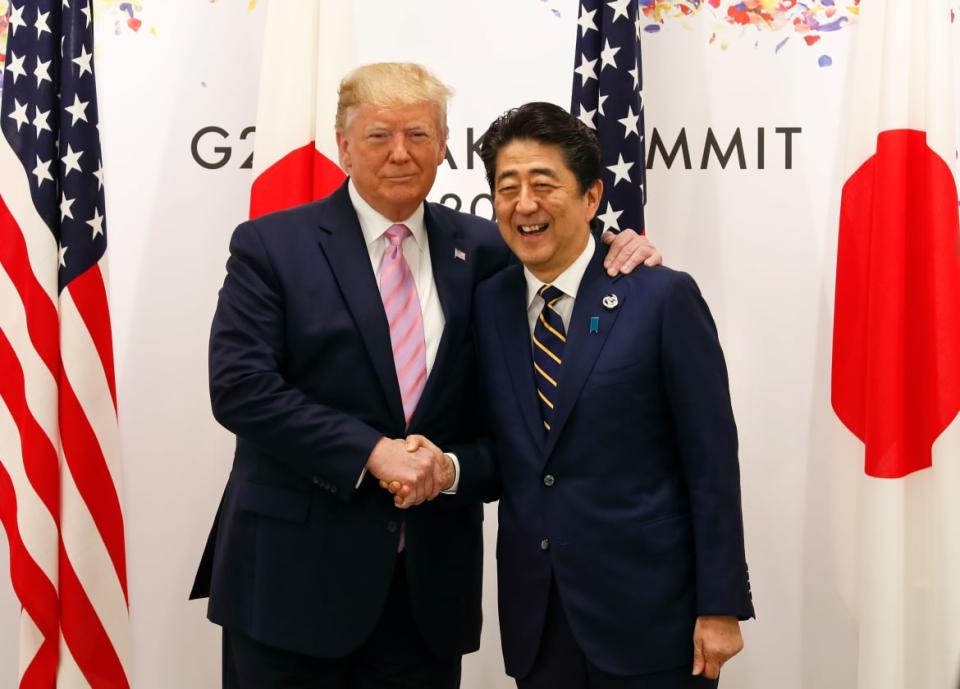Shinzo Abe Was ‘Trump Before Trump’—Except He Pulled It Off

- Oops!Something went wrong.Please try again later.
- Oops!Something went wrong.Please try again later.
Japan’s former Prime Minister Shinzo Abe died on Thursday in a scene reminiscent of the yakuza films he loved so much, gunned down in a crowd by a lone shooter who didn’t even try to escape.
The nation was shocked to learn that he had passed away when it was reported by state broadcaster NHK. There were many hoping that he might still pull through. In Nara, passersby began to place flowers on the site where he was shot, some praying for his safe journey through the spirit world to his next incarnation.
Fifteen years before the bloody incident, Shinzo Abe was considered politically finished when he resigned from office during his first stint as prime minister. He was exhausted, disliked and unable to weather the tsunami of scandals that surrounded his cabinet. But in 2012, he came back from the graveyard of failed prime ministers to rule for almost eight years.
When news spread that he had been shot twice and was in critical condition, his supporters hoped that he might be able to pull off another miracle—a physical resurrection.

Former Japanese Prime Minister Shinzo Abe makes a speech before he was shot from behind by a man in Nara, western Japan July 8, 2022.
That didn’t happen. But the man who Donald Trump advisor Steven Bannon famously praised as “Trump before Trump,” leaves behind a legacy that may have forever changed Japan. He reduced it to a perpetual one-party democracy that seems unlikely to change.
Abe certainly seems to have had a playbook that was similar to Donald Trump’s. He was a populist who tapped into racism and fears of change to stoke his base and consolidate power.
During his exile from power, Abe and his cabinet members allied with anti-Korean and other xenophobic groups. Abe drummed up anti-Korean sentiment to bolster his support, and made sure his allies did the dog-whistles while he kept his hands clean. While Trump portrayed immigrants as the boogeyman threatening Japan; Abe latched onto deep-rooted anti-Korean sentiment, towards both the Korean residents of Japan who stayed after the war and citizens of South and North Korea, former colonies of Japan. He appointed Eriko Yamatani, a woman closely associated with the flamingly anti-Korean group Zaitoku-Kai, to be the head of the National Public Safety Commission that oversees the National Police Agency.
He also embraced Nippon Kaigi, a conservative Shinto cult and political lobby. You could aptly compare his alliance with them to Trump’s absorption of The Tea Party and other far-right elements of the Republican Party.
Even while out of power, the Liberal Democratic Party, with Abe exerting influence, developed plans for a new Imperial Constitution for Japan. The removal of the post-war constitution, which was written with the help of the American occupation (not by them, as some claim now).
During his political exile, Abe even briefly became head of an extremist think-tank, Nihon Sosei (Create Japan), made up of LDP lawmakers and other conservative superstars. In May 2012, the organization released a clip of him at a gathering titled, “The Swearing In Of The Revised Constitution For Japan,” in which he and his cronies discussed the LDP’s substitute constitution.
There were some astonishing moments.
A former Minister of Justice Nagase Jinen, appointed during Abe’s first term in office, told the crowd, “The people’s sovereignty, basic human rights, and pacifism—these three things date to the postwar regime imposed by MacArthur on Japan, therefore we have to get rid of them to make the constitution our own!”
Abe loudly applauded this. Get rid of basic human rights, democracy, and wage warfare. Also, restore the emperor to power.

Japanese Prime Minister and Liberal Democratic Party (LDP) President Shinzo Abe delivers a speech at the party's annual convention on February 10, 2019 in Tokyo, Japan.
In other words: Make Japan Great Again. It’s no wonder that years later, Steve Bannon would say that Abe was Trump before Trump.
Abe was for many years the most powerful man in Japan’s ruling political party, the Liberal Democratic Party (LDP). In fact, he was campaigning for their candidates in the coming upper house elections when he was shot on Thursday. The LDP was founded in 1955 by Abe’s grandfather, a former war criminal who also served as prime minister. They were funded with money from yakuza associate and CIA operative Yoshio Kodama.
But starting with his fall from grace, the LDP’s popularity sank.
In 2009, it seemed like Japan might really change—and change for the better. For only the second time since 1955, the perpetually corrupt and archly conservative Liberal Democratic Party was kicked out of power and the liberal, egalitarian, feminist leaning Democratic Party of Japan took hold of the reigns of power. It was a revolution.
But it didn’t last long.
The DPJ had risen to power partly with expectations that they would be cleaner and less criminal than the LDP. But then one scandal after another implicating the party’s top management in unsavory ties with the yakuza threw dirt on their squeaky clean image.
The lower house elections of 2012 were a political meltdown. Almost all the opposition parties, including the DPJ, were decimated. And we know who returned from the political graveyard, ready to rule Japan with a rusty iron fist.
Shinzo Abe was quick to take revenge upon his critics once back in power, labeling the liberal newspaper Asahi Shimbun an enemy of the people. Later, he would tell Donald Trump, “You should handle the New York Times, the way I handled the Asahi.”

Donald Trump and Shinzo Abe at the start of talks at the venue of the G20 Summit on June 28, 2019 in Osaka, Japan.
He bullied the left-wing media and wined and dined the right-wing media—dragging Japan’s press freedom from 11 in the world, to as low as 72nd place in world rankings. In 2014, he created a Cabinet Personnel Bureau, which exercised ruthless control of bureaucratic appointments assuring that any government worker who didn’t tow the line, or released information contradicting the government, was either shunned, fired, or sidelined. It worked very effectively, and some high-ranking officials even took it upon themselves to cover up Abe-related scandals without direct orders to do so.
Television anchors and pundits that were too critical of Abe vanished from the airwaves. The world’s largest newspaper, the Yomiuri Shimbun, smeared his biggest critic in the Education Ministry for “frequenting sexy bars in Kabukicho.” He had no qualms about using the media for defamation campaigns and the media, and, eager for spoon-fed scoops, was happy to comply.
Eventually, in 2020, the weight of political scandals and an investigation into election law violations by Abe forced him to resign under the guise of “medical issues.” A few months later he threw his political secretary under the bus, and was more or less exonerated. He kept a low-profile for months but couldn’t resist the lime-light.
Shinzo Abe failed to change even one word of Japan’s constitution in the end, but did pass several laws that are still eating away at it, including Article 9, Japan’s declaration of pacifism.
His greatest achievement? Having so thoroughly discredited opposition parties and critical media that Japan isn’t even reminiscent of a two-party democracy. It’s a one-party democracy, where the media has its tails between its legs, and is likely to stay that way for decades.
Get the Daily Beast's biggest scoops and scandals delivered right to your inbox. Sign up now.
Stay informed and gain unlimited access to the Daily Beast's unmatched reporting. Subscribe now.

